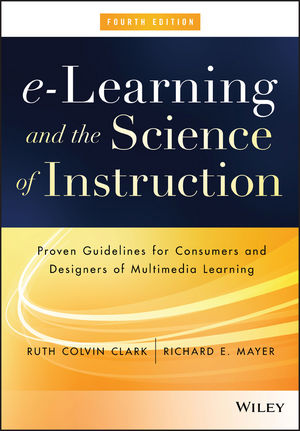Plus de 524 000 visiteuses et visiteurs par an!
Menu
Plus de 524 000 visiteuses et visiteurs par an!
Plus de 524 000 visiteuses et visiteurs par an!

Fully revised with two new chapters and sixteen updated chapters, e-Learning and the Science of Instruction: Proven Guidelines for Consumers and Designers of Multimedia Learning is your essential reference for evidence-based guidelines for designing, developing and evaluating asynchronous and synchronous e-Learning for workforce training and educational courseware. There is a great deal of valid experimental research on best methods to use in the design of e-learning lessons that support human learning processes. This scientific research is found in diverse academic journals and presented at research conferences not attended by most practitioners. In this book, Ruth Clark and Richard Mayer have gathered, organized, and illustrated that research to give you a practical guide in one place. In this Fourth Edition new evidence is included on the best use of text, audio, and graphics in e-learning as well as design guidelines for examples, practice exercises, computer-supported collaborative learning, and thinking skills lessons. Two new chapters focus on effective and ineffective forms of engagement in e-learning and the latest evidence on best practices in design of games for learning. You will find research summaries, examples, and checklists that show you: The kinds of visuals that best promote learning How and when to use instructional animations for optimal learning How best to use text and audio to describe visuals Techniques to improve learning through personalized language and on-screen agents What instructional techniques make learning games effective The effects of playing commercial games on basic cognitive skills You can use the evidence and guidelines in this book to guide your own design decisions as well as to communicate proven practices to your development team, subject matter experts, or e-learning students.
Clark, R.C. & Mayer, R.E. (2011). e-Learning and the Science of Instruction: Proven Guidelines for Consumers and Designers of Multimedia Learning (3rd Edition). San Francisco: Pfeiffer.
Reconnaissance du territoire autochtone
Contact North | Contact Nord reconnaît et respecte que son travail, ainsi que celui de ses partenaires communautaires, se déroule sur les territoires traditionnels des peuples autochtones à travers l’Ontario.